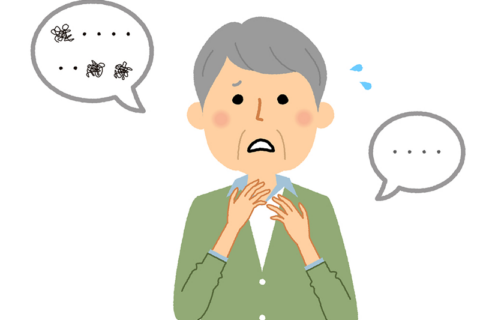Why Do I Feel Like I Can’t Swallow?

Enjoying a favorite food or sharing a meal with loved ones is one of life’s great pleasures. While eating and swallowing is a daily routine event, that doesn’t mean that it is a simple process. Swallowing is actually very complex, involving dozens of muscles and the coordination of several neural pathways to take the food into the mouth, prepare it for swallowing, and transport it to the stomach for digestion. When there is a problem with any part of the swallowing process, the result can be dysphagia, or difficulty swallowing. Sometimes, dysphagia is accompanied by odynophagia, or pain with swallowing. If it is not properly addressed, dysphagia can lead to serious medical issues.
What is dysphagia? Simply put, it is a swallowing disorder. For better clarity on what that means, it helps to understand the swallowing process. Swallowing happens in 4 key phases:
- The Pre-oral phase occurs before food or liquid enters your mouth. This stage is triggered by the anticipation of food and liquid via sight, smell, and hunger cues which activate the salivary glands in your mouth in preparation for intake.
- The oral phase occurs in the mouth. During this phase the tongue, cheeks, lips, and jaw work together to keep food or liquid inside your mouth without leakage and ensure the bolus it the correct size and texture for a safe and efficient swallow by adequately chewing and mixing the bolus with saliva. Finally, the bolus is transported toward the back of your mouth where the swallow reflex is triggered.
The pharyngeal phase involves the throat. When the tongue has pushed the food or liquid to the back of the mouth, this triggers a swallow reflex which immediately closes your vocal cords and moves your larynx to protect your airway to ensure food or liquid passes through the pharynx (throat) and into your esophagus avoiding your lungs. A peristaltic wave then helps move the bolus down through your esophagus where it is eventually emptied into your stomach.
- The esophageal phase moves food into the stomach. The esophagus is the tube directly behind your trachea (airway) that connects to the stomach. Food can become stuck in the esophagus and a problem with the esophagus can cause vomiting and can acid reflux.
What causes dysphagia? Dysphagia happens because of a problem with neural control or muscular weakness in the structures necessary for swallowing. These disruptions can impact the body’s ability to adequately sense or taste food, keep food or liquid in the mouth, manipulate food in the oral cavity, or chew food to a safe consistency, and may interfere with the swallow reflex which helps protect airways and transport food into the stomach. Furthermore, medications can cause dry mouth (xerostomia) making it difficult to swallow. Some conditions can increase the risk of dysphagia including:
- Neurological Causes: These include neurodegenerative conditions such as Parkinson’s disease, multiple sclerosis, amyotrophic lateral sclerosis (ALS), cerebral palsy, or Alzheimer’s disease as well as acute injuries such as a stroke, spinal cord injury, or traumatic brain injury.
- Muscular disorders: These include disorders of the esophagus, like achalasia, systemic sclerosis (scleroderma), cricopharyngeal spasms, and esophageal spasms as well as conditions that affect the muscles of the entire body such as myasthenia gravis and muscular dystrophy.
- Anatomical differences related to the head, mouth, and neck: Esophageal cancer or cancer in the mouth or throat can cause difficulty swallowing, as can injuries to the head, neck, or mouth. Those recovering from neck surgery may incur short or long-term swallowing trouble and orofacial differences such as a cleft lip or palate, missing teeth and ill-fitting dentures may impact the ease and safety of swallowing. Other conditions such as acid reflux can cause scar tissue to form in the esophagus, and tonsillitis can cause pain and inflammation, which can make swallowing difficult.
- Aging: The natural progression of aging causes structural and physiological changes that may affect the strength and coordination of muscles involved in swallowing. These may impact adequate chewing, efficient transfer of food from the mouth to the stomach, and protection the airway in a timely manner. Many older adults are also on medications which may create or exacerbate symptoms of dysphagia adding risk of dehydration, nutritional deficits, and aspiration pneumonia.
Fortunately, dysphagia treatment is effective and can greatly improve your quality of life. There are many evidence-based treatment options available. The type of treatment that is used will depend on a number of factors including overall medical condition and the type of dysphagia experienced. Doctors and licensed speech-language pathologists use many testing tools like the Flexible Endoscopic Evaluation of Swallowing with Sensory Testing (FEESST) and Modified Barium Swallows to examine how the structures of the mouth and throat respond under different swallowing conditions to diagnose and treat your condition.
For those having difficulty chewing and forming an adequate bolus due to lip, tongue, and/or jaw muscle weakness targeted exercises to improve the strength and range of motion of specific muscles may be helpful. Problems arising from sensory changes may benefit from strategies that modifying bite size, texture, and temperature. Use of specific maneuvers to support safe and efficient swallowing such as performing an effortful swallow or tucking your chin when swallowing so food and liquids do not enter the trachea when swallowing can also be effective.
If you are looking for a speech language pathologist to help address your dysphagia, contact Open Lines Speech and Communication. At Open Lines®, we promote evidenced based care and an integrated approach to therapy. We strive to use speech language pathology to create Open Lines® of communication in a supportive, caring atmosphere, and we are committed to making an impact that goes beyond the clinical environment. It is our goal open the lines of communication for our clients so that they can make themselves understood and be confident members of their communities.
If you’re struggling with communication difficulties, it’s time to turn to Open Lines®. Contact us via phone (212-430-6800), email info@openlines.com, or by filling out our convenient contact form. Improve your communication skills and unlock your potential with Open Lines® Speech and Communication in New York today!
Get in Touch With Open Lines®














